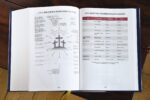Ezra: A Second Exodus

The Jews’ return from the Babylonian captivity seemed like a second Exodus, sovereignly patterned in some ways after Israel’s first redemption from Egyptian bondage. The return trip from Babylon involved activities similar to those of the original Exodus:
1) Rebuilding of the temple and the city walls
2) Reinstitution of the law, which made Zerubbabel, Ezra, and Nehemiah collectively seem like a second Moses
3) Challenge of the local enemies
4) Temptation to intermarry with non-Jews, resulting in idolatry
Other parallels between the original Exodus and the return from Babylon must have seemed to the returnees as though they had been given a fresh start by God. In his account of the return, Ezra drew upon a collection of Persian administrative documents to which he had access as a scribe.
The presence of actual royal administrative documents carries a powerful message when accompanied by the resounding line “the hand of the Lord my God was upon him/me” (Ezra 7:6, 28). The decrees, proclamations, letters, lists, genealogies, and memoranda, many of them written by the Persian administration, attest to the sovereign hand of God in Israel’s restoration.
The primary message of the book is that God orchestrated the past grim situation (captivity) and would continue to work through a pagan king and his successors to give Judah hope for the future (return). God’s administration overrides that of any of the kings of this world, and thus the book of Ezra is a message of God’s continuing covenant grace to Israel.
Another prominent theme which surfaces in Ezra is opposition from the local Samaritan residents whose ancestors had been imported from Assyria (Ezra 4:2; compare John 4:4–42). For reasons of spiritual sabotage, Israel’s enemies requested to participate in rebuilding the temple (Ezra 4:1-2). After being shunned, the enemies hired counselors against the Jews (compare Ezra 4:4-5).
But the Lord, through the preaching of Haggai and Zechariah, rekindled the spirit of the people and their leaders to build, with the words “… take courage… and work; for I am with you” (Haggai 2:4; compare Ezra 4:24–5:2). The reconstruction resumed (ca. 520 B.C.) and the temple was soon finished, dedicated, and back in service to God (ca. 516 B.C.).
Consider journaling about …
Was there a time when you were discouraged enough to consider quitting or you actually quit something you knew God called you to do? Where did that discouragement come from
As we see in both Ezra and Haggai, God used preaching to rekindle people’s spirits. Recall a time when a sermon inspired or encouraged you to continue on.
#######################################################
Content in the article taken from the ESV MacArthur Study Bible.
Unleashing God’s Truth One Verse at a Time
Drawing on more than fifty years of dedicated pastoral and scholarly work, Dr. John MacArthur’s verse-by-verse study notes, book introductions, and articles help make God known to you through the study of His Word. This second edition of The MaArthur Study Bible is fully updated, redesigned and expanded from the first edition.


















